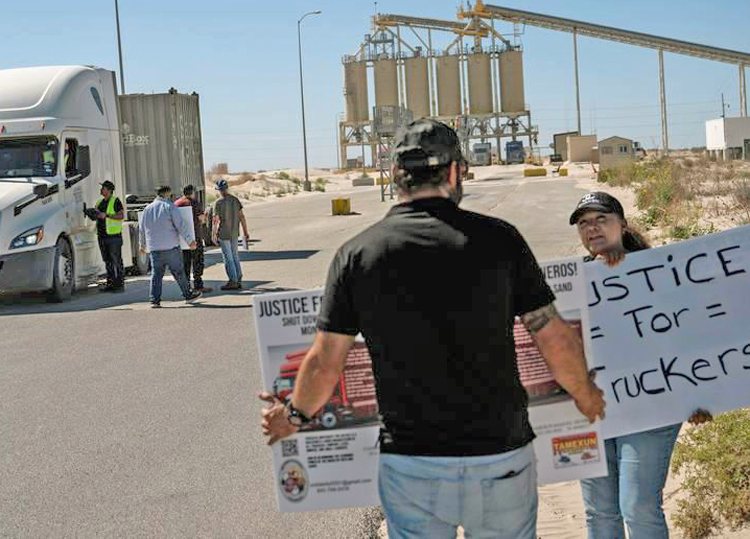Both in Mexico, where production is rapidly expanding for export to the U.S., and in western Texas, one of the centers of oil fracking in the country, independent truckers are coming together to demand better pay, improved working conditions and protection from theft, kidnapping and murder in Mexico.
Truckers have blocked highways in several Mexican states to demand protection from criminal gangs hijacking trucks to steal their loads, and for an end to extortion by the police and National Guard.
Nearly 6 million trucks transported some $300 billion worth of merchandise — from auto parts to avocados — over the U.S.-Mexico border in Laredo, Texas, in 2023. They are hired by U.S. and Mexican brokers and transportation companies who take advantage of the truckers’ independent contractor status to pass insurance, fuel, maintenance and other overhead costs onto their backs.
Independent owner-operators and company drivers on the U.S. side of the border face similar exploitation as well. On July 1, truck drivers organized by the U.S.-based Truckers Movement for Justice and the United Mexican Carriers (Tamexun) held protests in Texas’ western Permian Basin to call attention to their demands for pay for all hours worked, fuel surcharge payments to help cover the cost of diesel and better conditions.
Together with the Eagle Ford Shale area on the other side of Texas, the Permian Basin is the largest crude oil producing region in the U.S. The drivers transport the quartz sand that is used in fracking. It’s injected into wells to blast and hold open cracks to get oil and natural gas out of the ground.
“We are demanding payment for all our work and what we call quality of life issues,” Billy Randel, a leader of the coalition, told the Militant. “We want toilets, a place where we can park safely. You know how dehumanizing that is for either a man or a woman to have to use a bucket?”
Drivers often wait for long hours sitting idle while their trucks are loaded and unloaded, for which they get no pay. They can’t leave their place in line no matter how long the wait is. If they do, they can be fined, suspended or fired.
They are paid by the ton or the load. While the shippers — mine owners or oil service companies — claim they do pay for fuel charges or waiting time to carriers, “to a person, no man or woman driver, has ever seen that in their settlement statement,” Randel said.
“It’s not right that we’re out waiting in 90 degree heat or minus zero in the winter for companies that are making billions of dollars a day, and we don’t have bathrooms or a place with running water, or heat when it is cold and air when it’s hot,” said Oscar Lovo. He has been a driver for 18 years, since he got out of high school.
Owner-operators pay a monthly fee or a percentage per load to use shippers’ trailers. If they miss work, they’re penalized for not using the trailer that day. “Say my truck goes down, or I have an emergency with my kids, I have to pay a penalty for not using it,” Lovo said. “You have to pay them for not going to work! Who in the world does that?”
Some of the drivers participating in the protests are B-1 visa drivers from Mexico hauling goods into the U.S. The U.S. government permits them to transport cargo across the border. Then they are supposed to either deadhead back or find a load in the U.S. bound for Mexico. However, many take jobs carting loads to other destinations in the U.S. For these trips they are paid much lower than the going rate.
“Trucking companies are using our brothers and sisters in Mexico against our brothers and sisters in the United States,” said Randel. “This is why we stand in solidarity and have built an alliance. We’ve got to fight.”
The truckers’ fight deserves the support of union-organized truckers and owner-operators across the U.S.


